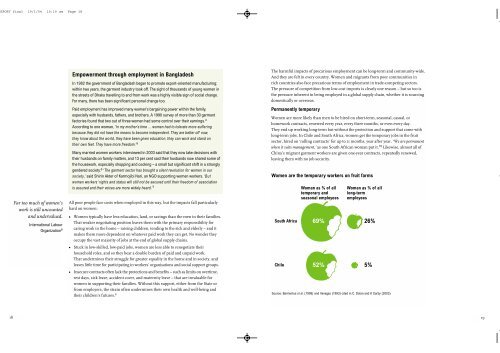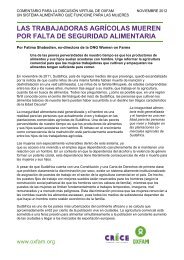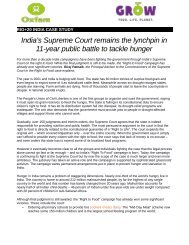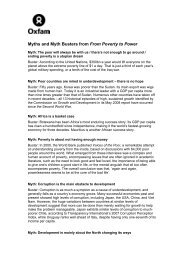EPORT final 19/1/04 10:19 am Page 18Far too much of women’swork is still uncountedand undervalued.<strong>International</strong> LabourOrganization 9Empowerment through employment in BangladeshIn 1982 the government of Bangladesh began to promote export-oriented manufacturing;within two years, the garment industry took off. The sight of thousands of young women inthe streets of Dhaka travelling to and from work was a highly visible sign of social change.For many, there has been significant personal change too.Paid employment has improved many women’s bargaining power within the family,especially with husbands, fathers, and brothers. A 1990 survey of more than 30 garmentfactories found that two out of three women had some control over their earnings. 4According to one woman, ‘In my mother’s time … women had to tolerate more sufferingbecause they did not have the means to become independent. They are better off now,they know about the world, they have been given education, they can work and stand ontheir own feet. They have more freedom.’ 5Many married women workers interviewed in 2003 said that they now take decisions withtheir husbands on family matters, and 13 per cent said their husbands now shared some ofthe housework, especially shopping and cooking – a small but significant shift in a stronglygendered society. 6 ‘The garment sector has brought a silent revolution for women in oursociety,’ said Shirin Akter of Karmojibi Nari, an NGO supporting women workers. ‘Butwomen workers’ rights and status will still not be secured until their freedom of associationis assured and their voices are more widely heard.’ 7All poor people face costs when employed in this way, but the impacts fall particularlyhard on women:• Women typically have less education, land, or savings than the men in their families.That weaker negotiating position leaves them with the primary responsibility forcaring work in the home – raising children, tending to the sick and elderly – and itmakes them more dependent on whatever paid work they can get. No wonder theyoccupy the vast majority of jobs at the end of global supply chains.• Stuck in low-skilled, low-paid jobs, women are less able to renegotiate theirhousehold roles, and so they bear a double burden of paid and unpaid work.That undermines their struggle for greater equality in the home and in society, andleaves little time for participating in workers’ organisations and social support groups.• Insecure contracts often lack the protections and benefits – such as limits on overtime,rest days, sick leave, accident cover, and maternity leave – that are invaluable forwomen in supporting their families. Without this support, either from the State orfrom employers, the strain often undermines their own health and well-being andtheir children’s futures. 8The harmful impacts of precarious employment can be long-term and community-wide.And they are felt in every country. Women and migrants from poor communities inrich countries also face precarious terms of employment in trade-competing sectors.The pressure of competition from low-cost imports is clearly one reason – but so too isthe pressure inherent in being employed in a global supply chain, whether it is sourcingdomestically or overseas.Permanently temporaryWomen are more likely than men to be hired on short-term, seasonal, casual, orhomework contracts, renewed every year, every three months, or even every day.They end up working long-term but without the protection and support that come withlong-term jobs. In Chile and South Africa, women get the temporary jobs in the fruitsector, hired on ‘rolling contracts’ for up to 11 months, year after year. ‘We are permanentwhen it suits management,’ as one South African woman put it. 10 Likewise, almost all ofChina’s migrant garment workers are given one-year contracts, repeatedly renewed,leaving them with no job security.Women are the temporary workers on fruit farmsSouth AfricaChileWoman as % of alltemporary andseasonal employees69%Woman as % of alllong-termemployees26%52% 5%Source: Barrientos et al. (1999) and Venegas (1993) cited in C. Dolan and K Sorby (2003)1819
EPORT final 19/1/04 10:19 am Page 20It is sometimes assumed that women want such ‘flexible’ jobs so that they have timeto care for their families. When those jobs are well protected under law, women canbenefit from having this choice. But for the vast majority of women interviewed,working on short-term contracts is not a choice but a necessity – and is all that they areoffered. For home-based workers in the UK (of whom 90 per cent are women and50 per cent are from ethnic minorities), the supply of work they receive frommanufacturers is highly irregular, sometimes with very short deadlines. ‘Homeworkersoften get no redundancy pay, holiday or sick pay, and no pension,’ said Linda Devereux,Director of the National Group on Homeworking. ‘This is not the kind of “flexibility” thatany woman worker is hoping for.’ 11 The increasing use of temporary and contract labouris a worrying trend in many countries.Employed: but who is the employer?When workers are not formally recognised as employees, they fall outside the protectionof labour law. In some countries, having no written contract means having no legalrecognition. In Bangladesh, only 46 per cent of women garment workers interviewedhad the letter of employment that is needed to establish the employment relationship.No wonder that almost none received pay slips or was enrolled in a health scheme, andthe vast majority got no paid maternity leave. 12 Layers of supply chain sub-contractingcan blur legal relationships too. In Chile, companies are liable in law if the sub-contractorsthey use fail to pay sub-contracted workers’ wages or benefits – but the law is not alwaysenforced. ‘In many cases the company has kept on workers who have not been paid by thefarm labour contractor,’ explained Jessica, hired through a contractor to pack grapes forexport to the USA. ‘The company tells them “But we have paid for all that – it is the farmlabourcontractor who has not fulfilled his obligations to you.”’ 13Little support for familiesPaid maternity leave is essential for supporting women as workers and as mothers –and for ensuring the health of the current and future workforce. But women hired onshort-term contracts who become pregnant simply do not get their contract renewed,and others with the right in law often cannot claim it in practice. In Kenya, some garmentworkers seek back-street abortions, losing the baby and risking their own lives in order tosave the job. And those who do have children pay the price. ‘In my company you lose yourwork number when you go on maternity,’ explained one young woman. ‘This means that,if you are lucky enough to be readmitted, you come back as a new employee, losing all thebenefits for the period worked before going on maternity leave.’ 14Short-term hiring for long-term jobsHiring workers on short-term contracts can belegitimate – for example, for jobs that are genuinelyseasonal or temporary in nature. But manyemployers abuse the law and repeatedly hireworkers this way for years. Why? It cuts their costs,avoiding employment benefits. It discouragesworkers from joining unions, by withholding jobsecurity. And it enables employers to expand andcontract the workforce to fit fluctuating order levels.But these ‘savings’ for employers turn into socialcosts for women and their families. Policy makersmay not calculate these costs because they arenot monetary, but women know the price of, say,having no sick leave: working when ill or sendingsick children off to school.IndonesiaSince the economic crisis of 1998, the use ofshort-term contracts has increased significantly.New legislation in 2003 clarified and limited thelegitimate uses of such contracts and allowsonly one renewal. But the limits are not effectivelyenforced. One network of Indonesian NGOs andunions is documenting just how widespreadtheir misuse has become. Initial findings fromsix factories in West Java revealed between 15and 95 per cent of workers were repeatedly hiredon short-term contracts, three to 12 months ata time. They are making sports shoes, garments,and metal products – work which is neithertemporary nor seasonal by nature. 15South AfricaThe Confederation of Employers of South Africa,COFESA, shows member companies how to cutlabour costs through a legislative loophole: turnemployees into ‘independent contractors’. Thisinstantly cuts labour costs by 30 per cent andmakes employers exempt from obligations underthe Labour Relations Act. For garment workers,the switch may mean doing the same work butwithout the employee protections of a minimumwage and overtime limits, paid leave, or medicaland unemployment benefit schemes. COFESA’sfounder estimates that their advice has helped toturn one and a half million of South Africa’sworkers into independent contractors – and thatthe practice will keep spreading. ‘The system canwork in any industry,’ he said. ‘We can alwayswork out something.’ 16ColombiaLabour law reforms in 2002 lengthened the workday,cut overtime pay, reduced severance payments,and introduced more flexible contracts. CACTUS,an NGO supporting women working in the flowerindustry, is concerned that their use may spreadthroughout the sector. ‘With these policies, labourconditions will get worse,’ said Ricardo Zamudio,Director of CACTUS. ‘According to the government,these policies of cutting costs for enterprises areintended to create jobs, but they don’t guaranteenew posts, they just deepen poverty.’ 17HondurasThe government’s proposed labour reformswould permit garment factories to hire up to30 per cent of their workers on temporary contracts.If passed, the reforms would save employersUS$90m over three years. For workers, that wouldmean a loss of job security, paid leave, socialsecurity, and the annual bonus. An alliance ofnational unions and NGOs are campaigning tostop this change in the law so that womenworkers do not lose the support and benefits thatthey need. ‘The majority of people who will beaffected by this law will be single mothers, poorpeople, and migrants,’ said Maria Luisa Regaladoof CODEMUH, an NGO in that alliance. ‘If they aredismissed, they will be totally unprotected.’ 182021
















